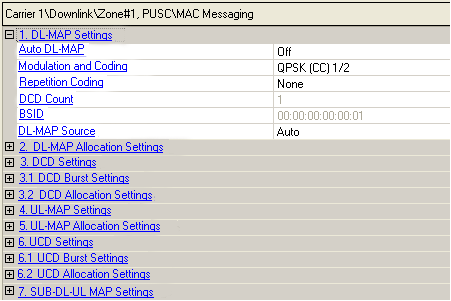
DL_MAP is a MAC Layer Message that tells a subscriber station (SS) about the construction of the downlink OFDMA signal. This allows the SS to decode the DL transmission and extract any messages that are either specifically designated for a particular SS or any broadcast messages that the BTS is sending to all SSs.

Choices: Off, Normal, Compressed
Auto FCH must be On to use Auto DL-MAP. The table below shows the possible combinations for Auto DL-MAP, Auto FCH, and Auto UL-MAP.
|
Auto FCH |
Auto DL-MAP |
Auto UL-MAP |
|---|---|---|
|
Off |
Off |
Off |
|
On |
Off |
Off |
|
On |
Normal |
Off |
|
On |
Normal |
Normal |
|
On |
Compressed |
Normal |
|
On |
Compressed |
Compressed |
Choices: QPSK (CC) 1/2, QPSK (CTC) 1/2
Select the modulation and coding type to be used for the DL-MAP and DCD MAC PDU concatenated bursts in the DL-MAP.
CC – data is randomized, encoded using convolutional coding, and interleaved according to the standard specifications.
CTC – data is randomized, encoded using convolutional turbo coding, and interleaved according to the standard specifications.
Choices: None, 2, 4, 6
Set the number of times the data is repeated.
Range: 0 to 255
Enter the configuration change count of the DCD.
This is encoded in the DL-MAP, FCH and DCD messages and is incremented by one (module 256) whenever there is a downlink configuration change.
Select the base station identifier for the DL-MAP.
Choices: Auto, User Defined
Select the DL-MAP source to decide whether to use the automatically generated DL-MAP or the user defined DL-MAP information.
When it is set to User Defined, you can input your MAP file to be transmitted.
When you select User Defined as the DL-MAP Source, click the button in this cell to select your own DL-MAP file. User defined DL-MAP file must be a ASCII (text) file.
The DL_MAP Message format and the Compressed DL_MAP message format are defined in Table 16 and Table 305 of "IEEE Std 802.16e-2005, Amendment 2: for Physical and Medium Access Control Layers for Combined Fixed and Mobile Operation in Licensed Bands and Corrigendum 1, - Part 16: Air Interface for Fixed Broadband Wireless Access Systems, Section 8.4 WirelessMAN -OFDMA PHY, February 2006." on page 10-32.